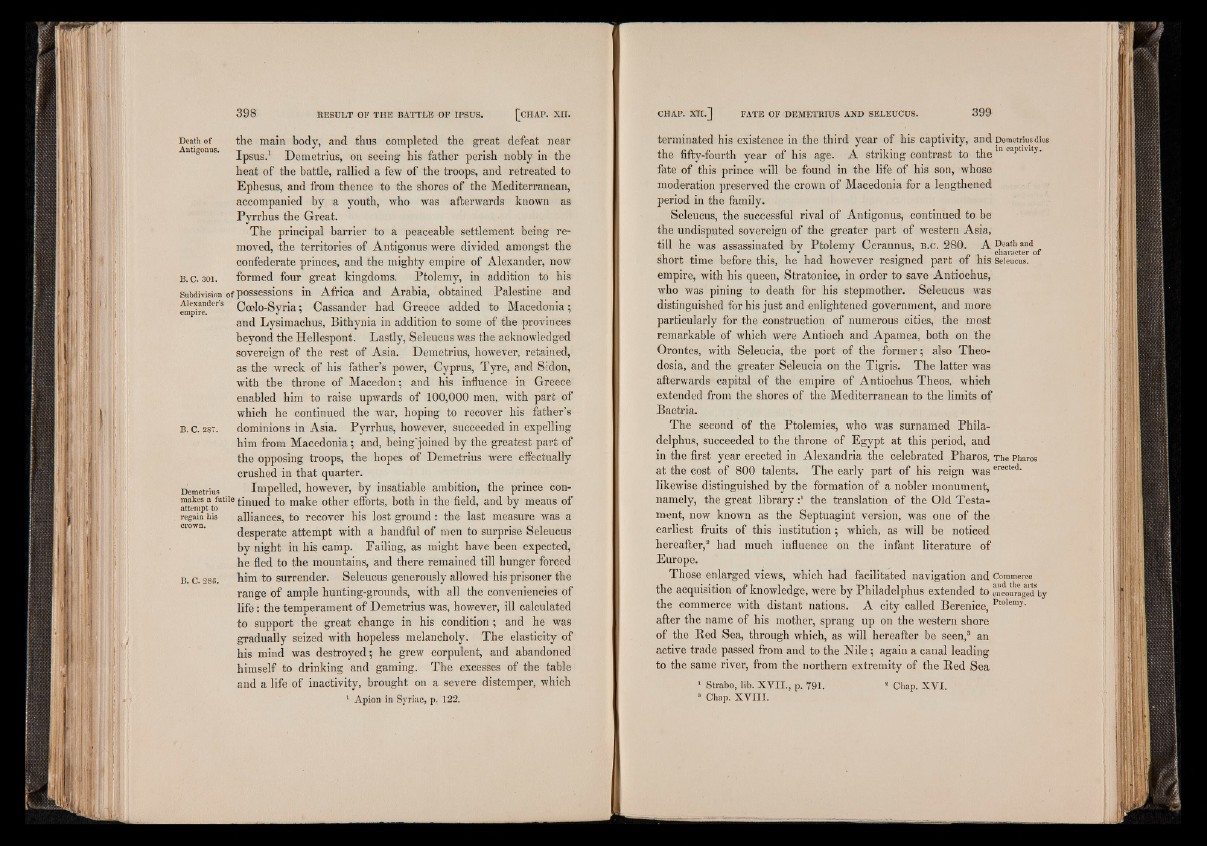
Death of the main body, and thus completed the great defeat near
D ' Ipsus.1 Demetrius, on seeing his father perish nobly in the
heat of the battle, rallied a few of the troops, and retreated to
Ephesus, and from thence to the shores of the Mediterranean,
accompanied by a youth, who was afterwards known as
Pyrrhus the Great.
The principal barrier to a peaceable settlement being removed,
the territories of Antigonus were divided amongst the
confederate princes, and the mighty empire of Alexander, now
B.C. 3oi. formed four great kingdoms. Ptolemy, in addition to his
Subdivision of possessions in Africa and Arabia, obtained Palestine and
empiredeiS Coelo-Syria; Cassander had Greece added to Macedonia;
and Lysimachus, Bithynia in addition to some of the provinces
beyond the Hellespont. Lastly, Seleucus was the acknowledged
sovereign of the rest of Asia. Demetrius, however, retained,
as the wreck of his father’s power, Cyprus, Tyre, and Sidon,
with the throne of Macedon; and his influence in Greece
enabled him to raise upwards of 100,000 men, with part of
which he continued the war, hoping to recover his father’s
B. C. 287. dominions in Asia. Pyrrhus, however, succeeded in expelling
him from Macedonia; and, being]oined by the greatest part of
the opposing troops, the hopes of Demetrius were effectually
crushed in that quarter.
Demetrius Impelled, however, by insatiable ambition, the prince con-
makes a futile f;in u e c [ t 0 make other efforts, both in the field, and by means of attempt to s i
regain his alliances, to recover his lost ground : the last measure was a
desperate attempt with a handful of men to surprise Seleucus
by night in his camp. Failing, as might have been expected,
he fled to the mountains, and there remained till hunger forced
b . c. 286. him to surrender. Seleucus generously allowed his prisoner the
range of ample hunting-grounds, with all the conveniencies of
life: the temperament of Demetrius was, however, ill calculated
to support the great change in his condition ; and he was
gradually seized with hopeless melancholy. The elasticity of
his mind was destroyed; he grew corpulent, and abandoned
himself to drinking and gaming. The excesses of the table
and a life of inactivity, brought on a severe distemper, which
1 Apion in Syriac, p. 122.
terminated his existence in the third year of his captivity, and Demetrius dies
the fifty-fourth year of his age. A striking contrast to thein captlvlty-
fate of this prince will be found in the life of his son, whose
moderation preserved the crown of Macedonia for a lengthened
period in the family.
Seleucus, the successful rival of Antigonus, continued to be
the undisputed sovereign of the greater part of western Asia,
till he was assassinated by Ptolemy Ceraunus, b .c . 280. A Death and
i • n * i n character of short time before this, he had however resigned part of his Seleucus.
empire, with his queen, Stratonice, in order to save Antiochus,
who was pining to death for his stepmother. Seleucus was
distinguished for his just and enlightened government, and more
particularly for the construction of numerous cities, the most
remarkable of which were Antioch and Apamea, both on the
Orontes, with Seleucia, the port of the former; also Theodosia,
and the greater Seleucia on the Tigris. The latter was
afterwards capital of the empire of Antiochus Theos, which
extended from the shores of the Mediterranean to the limits of
Bactria.
The second of the Ptolemies, who was surnamed Phila-
delphus, succeeded to the throne of Egypt at this period, and
in the first year erected in Alexandria the celebrated Pharos, The Pharos
at the cost of 800 talents. The early part of his reign was erected-
likewise distinguished by the formation of a nobler monument,
namely, the great lib r a r y th e translation of the Old Testament,
now known as the Septuagint version, was one of the
earliest fruits of this institution ; which, as will be noticed
hereafter,2 had much influence on the infant literature of
Europe.
Those enlarged views, which had facilitated navigation and Commerce
the acquisition of knowledge, were by Philadelphus extended to encourage?by
the commerce with distant nations. A city called Berenice, Ptolemi-
after the name of his mother, sprang up on the western shore
of the Bed Sea, through which, as will hereafter be seen,3 an
active trade passed from and to the N ile ; again a canal leading
to the same river, from the northern extremity of the Red Sea
1 Strabo, lib. X V I I ., p. 791. 2 Chap. X V I.
8 Chap. X V I I I .